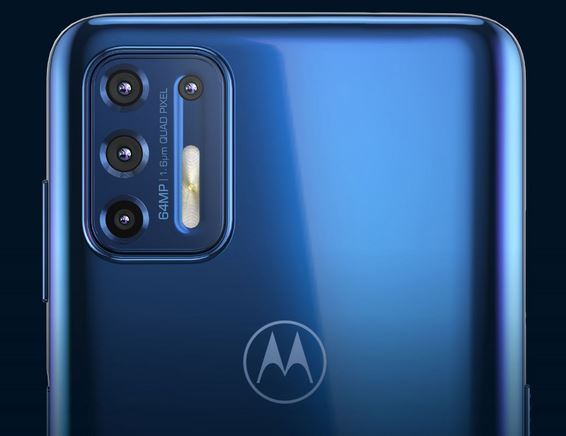Price (RRP): $399
Manufacturer: Motorola
Motorola has just released two new 5G phones – the Razr 5G and g 5G as well as the recent Motorola Edge 5G. The Motorola g9 Plus proves there is a lot of life left in the 4G market.
And there is amazing life in this device. The Motorola g9 Plus at $399 sports a 5000mAh battery, 30W turbo charge, 6.8″ LPTS screen, Qualcomm SD730G, 6/128GB/microSD, 64MP Quad camera, 16MP selfie, Wi-Fi 5, BT 5, NFC and that good old Motorola g-series build quality and reliability.
I am impressed at how much value can be crammed into a $399 phone. Then you could say the same about the Motorola g9 Play 4.3/5 at $299 – it is a whole lot of phone too.
Australian Review: Motorola g9 Plus 4G Model XT2087-2 6/128GB Dual sim
We use FAIL, PASS and EXCEED against all test paradigms.
First impression – PASS
It is a big phone – 169.98 x 78.1 x 9.69 mm x 223.3g but I guess it has to be to fit so much in. Add to that the clear bumper cover, and you are pushing 240g.
Because of its 6.81″ screen size, it has a 2400 x 1080 screen to keep the pixel density high at 386ppi. It is a nice colourful screen. The rear has a camera block and a LED flash. That familiar BatWing logo marks it as a Motorola. The fingerprint reader is the power button. A dedicated Google Assistant button is opposite.

Screen – PASS
| Size | 6.81″ |
| Type | LTPS 60Hz, glossy with single O-hole top left |
| Resolution | 2400 x 1080 |
| PPI/Ratio | 386ppi and 20:9 |
| Colour Brightness Contrast Delta E Gamut RGB adj Temp adj |
16.7M Tested at 360/440 (typical auto-off/on) and 390/580 max Note screen brightness varies unevenly from 360-390 nits Tested 600:1 auto-off and 1100:1 auto-on 3.9 (<4 is good) 95% sRGB (Natural). Saturated takes it to 8. No No – the screen is about 6,000°, Kelvin |
| HDR | It will decode HDR10, but we struggled to see any difference due to the lower brightness/contrast levels. |
| Daylight Viewing angle AOD Dark mode Blue light |
Average – due to lower typical brightness and contrast. Issues with Polarised glasses and off-angle viewing – otherwise good No, but Peek Display activates if you glance at the screen Yes No certification |
| DRM | Widevine L1 HDCP 2.3 Will stream HD video from most sources and decodes HDR content |
| Gaming | 39ms G-T-G means its not the most responsive screen. PUBG plays at 30fps in medium settings. |
| Protection | Flat tempered glass (not Gorilla Glass) |
| Face ID | 2D camera-based. Test: 6/10 success.No screen fill for low light. |
It comes down to what you expect for $399. I don’t expect precise colour accuracy even brightness. But I also don’t expect an LTPS screen usually found on more expensive devices.
Processor – PASS
| SoC | Qualcomm SD730G 8nm 2 x 2.21Ghz + 6 x 1.8Ghz |
| Modem | X15 LTE |
| GPU | Adreno 618 Compute Open CL: 1163 Decodes HEVC, VP9, AVC |
| Game use | The 730′ G ‘means ‘gaming. It supports select Snapdragon Elite Gaming features like Wi-Fi latency manager, anti-cheat, jank reducer. It is 15% faster than the standard SD730. Regrettably, it won’t achieve the higher frame rates that pro gamers expect. |
| RAM | 6GB LPDDR4X |
| Storage | 128GB UFS 2.1 (102GB free) Internal 487.53/213.57 Mbps sequential read/write – good External USB-C 3.1 Gen 1 26.67/24.56 – this is consistent with USB 2.0 speeds |
| micro-SD | Micro-SD to 512GB |
| Geek Bench 5 |
Single: 547 Multi: 1752 It is in between the SD730 and the SD845 |
| Throttle 15-minute |
Max: 143,900 GIPS, Average: 139,295 – 7% loss over 15 minutes CPU temp reached 93°, and external temp reached 42° While the lack of throttling is great, the CPU temp is overly high. It should not be an issue for daily use. |

The SD730G is a newish 8nm SoC used by dozens of 4G smartphones including the Motorola One Fusion+, Google Pixel 4a ($599 4.6/5), vivo X50, realme X2 and many more.
It is quite good with reasonable levels of AI. Performance is responsive, although it can chug when post-processing photos.
Comms – PASS
| Wi-Fi | Wi-Fi 5 AC 1×1 MIMO Signal Strength 5Ghz – distance from ASUS AX1100 router 2m: -38dBm/433Mbps 5m: -65dBm/116Mbps (-68 is unusable) 10m: -78dBm/45Mbps (unusable – manually select 2.4GHz) |
| Bluetooth | BT 5.0 |
| GPS | Single good for turn-by-turn navigation |
| NFC | Yes PayWave |
| USB-C | USB 2.0 – no video out but supports OTG |
| Sensors | Combo Accelerometer, Gyroscope (can make screen auto-rotate overt touchy) Proximity, Ambient Light, Sensor Hub |
While it is Wi-FI 5 AC, it is a maximum of 433MBps due to the 1×1 antenna. Wi-Fi signal strength is fine.
LTE – PASS
| SIM | Hybrid dual sim shared with micro-SD (one active at a time) |
| Ring tone | Dual |
| Support | VoLTE – carrier dependent – generally yes Wi-Fi calling – Yes |
| Speed (Mbps) | Ping: 48ms DL: 14.3Mbps UL: 5.6 Mbps Average for a 3-bar area |
| LTE Band | 1, 2, 3, 4, 5, 7, 8, 20, 28, 38, 40, 41, 66 All bands for Australia and most OS 4G bands |
| Test | (Using Boost Prepaid card on the Telstra retail network – that means band 28). -105dBm and 31.6fW in a 3-bar reception area (-110 is considered unusable( – average |
It is a city phone with about half the signal strength of a Telstra Bluetick rural phone.
Battery – PASS+
| Battery mAh | 5000mAh |
| Charger | 5V/3A/15W, 9V/3A/27W and 10V/3A/30W Test: It supports 3A output on all voltages Charge claim: 12 hrs use in 10 minutes 100% in 60 minutes Test: 54% – 30 minutes 0-100% – 75-81 minutes (over three full charges) We initially noticed that screen-on idle drain was a little high at 800mA and 100% load was nearly 8A. However, it did settle down after a day or so to about 300mA. It was likely caused by background apps that were later closed by the battery AI manager. |
| Tests |
Video Loop test: 60Hz 1080p/50%/aeroplane mode – 18 hrs Youtube HD – 11 hrs Gaming – 6.5 hrs Typical use 4G, Wi-Fi Test – 13 hrs MP3 music test: 50% volume played from storage – 100+ hrs 100% load Battery drain – 7 hrs T-Rex – 60Hz – 472.2 min (7.87hrs) and 3090 frames Drain screen off: mA (about 15-20 days) Screen-on time: 10-12 hours |
Netflix/YouTube HD streaming took about 8% battery life per hour. Our PUGB test drained 12% in an hour.
The 30W charger is brilliant. It works equally well with any USB-C PD charger over 30W.
Sound – PASS
| Speakers | Mono earpiece and down-firing speaker* |
| AMP | Uses the Qualcomm SD730G Aqstic SM6150 |
| BT codecs | Codecs are SBC (standard), LDAC (Sony), aptX/HD (Qualcomm), ACC (Apple) etc. |
| Mic | Dual NC |
| 3.5mm | Yes at top and standard buds supplied |
| Tests dB Anything over 80dB is excellent |
Media – 75 Ring – 77 Alarm – 77.5 Earpiece – 60 Handsfree – loud and clear |
| Sound stage | As a mono device, there is no Left/Right separation |
* It is not fair to measure the sound signature on a mono speaker system. The primary use is for clear voice. It is not for music or movies with no bass or mid before 100Hz and no treble after 10kHz.
Volume is average for this type of device. Its capped at 80dB anyway to protect hearing.
BT 5.0 drove our reference Sony WH-1000xM4 in SBC, AAC and LDAC modes and provided good clear sound and plenty of volume.
Sound quality
We do not measure the frequency response of a mono system because turning is for clear voice – no bass, balanced-to-late mid, early treble. It is Bright Vocal (bass recessed, mids/treble boosted).
Build – PASS
| Size/Weight | 169.98 x 78.1 x 9.69 mm x 223.3g or 240g with TPU case |
| Colours | Navy Blue |
| Build | Glass – toughened Frame – plastic Back – painted plastic |
| IP | Water-resistant but no formal rating |
| In the box | Bumper cover 30W charger USB-C to USB-C cable 3.5mm standard buds |

While Gorilla Glass (3 or later) would have been nice Motorola, do use a toughened glass. It should withstand the rigours associated with g-series reliability.
Android 10 – PASS
| Android | Google Android 10 Security patch date: 1 August 2020 |
| UI | My UX Gestures: Quick capture, Fast torch, Three-finger screenshot, Screenshot editor, Flip for DND, Pick up to silence, Media controls |
| All standard apps, Google Lens and Assistant. Dedicated Google Assistant key. |
|
| Bloatware | |
| Update Policy | Assume one OS update. Security patches regularly Security patch Note that security updates handled by Google in Android 11 |
| Security | Fingerprint 9/10 FaceID 6/10 – lacks low light capability |
My UX adds a light touch to Android. It should get Android 11.
Missing – Nothing really PASS
| IP | Its nano-coating makes it light rain resistant |
| Qi | Not expected at this price |
| Mono speaker | Expected at this price |
This is a 100% functional device.
Motorola G9 PLUS camera – PASS

| Camera | Primary 64MP binned to 16MP |
Ultra-wide 8MP |
Macro 2MP |
Depth 2MP |
Selfie 16mp |
| Sensor | Samsung S5KGW1 | Samsung S5K4H7 |
Omnivision OV02b1 |
OV2b1 | OV16a1 |
| Lens | Not stated | ||||
| Focus | PDAF | AF | 2.5cm | FF | FF |
| Aperture f-stop | 1.8 | 2.2 | same | same | 2.0 |
| Pixel size um | .8 binned to 1.6 | 1.12 | 1.75 | same | 1.0 |
| FOV° and (cropped) | (67.7) | 118 | – | – | (62.7) |
| Stabilisation | Video EIS | Video EIS | |||
| Flash | Single | Screen fill | |||
| Zoom | 8X digital | ||||
| Video Max | 4K@30fps | 1080P@30 | 720P@30 | ||
| Features | Shot Optimisation, Auto smile capture, Gesture selfie, Smart composition, HDR, Timer, Active photos, Manual mode, Portrait mode, Cutout, Macro, Spot colour, Cinemagraph, Panorama, Live filter, High-res zoom, RAW, Best shot, Google Lens |
Screen flash, HDR, Timer, Face beauty, Auto smile capture, Gesture selfie, Shot optimisation, Active photos, Manual mode, Portrait mode, Spot colour, Cinemagraph, Group selfie, Live filter |
I had great hopes for this camera as I have reviewed many devices with a similar camera sensor setup. Motorola’s implementation is competent for day and office light but needs a lot of tweaking for low light.
Overall it is above a social media standard. Any foibles are fixable via firmware updates and no doubt Motorola will do this.
Note: All shots are taken with a tripod. Handheld shots are not recommended as it does not have optical image stabilisation.
Daylight, outdoors
Colours are OK but tend towards muted. Lack of OIS means it is easy to take a blurry shot. Motorola uses computational photography to try and sharpen the image and colours. AF seems a little slow. The first two shots are taken sequentially and give very different results.




The Ultrawide lens is soft (less detail), and colours are a little off.

Indoors Office Light (400 lumen)

Low light (room with less than 100 lumen)
With an f/1.8 aperture and even with binned images, you will get a blurry image with lots of noise unless you use a tripod.


Selfie
16MP bins to 4MP giving a post-processed image with fairly natural skin tones and good details. Wide selfie is a cropped 16MP shot and suffers from AI post-processing.
Macro
Good details and colours.

Bokeh
Rear camera: Good under day/office light but drops off in low light adding to much noise from post-processing.
Front camera: Without depth information, the separation of subject and foreground suffers.
Video
EIS stabilisation is good even at 4K@30fps. It is not as sharp as we are used to and colours and tend towards muted. As is typical of all phones in this price range mic sensitivity is to low for stereo recording.
Camera summary
I think Motorola can do a lot more tweaking on its camera firmware to fix this.
GadgetGuy’s take – Motorola g9 Plus is great value, and that is all you should expect
We are happy with the device. The screen is not as bright as we would have expected from LTPS, but that is not an issue unless you are in direct sunlight.
On every count is PASSed our test paradigms. And that may be the issue. While impressed with the Motorola G 5G at $499 (review here) this is just a good allrounder at $399.
Our advice – spend the extra $100 (note: it is only from Telcos on a plan) and get a faster SoC, Wi-Fi, same size battery, dual selfie and a similar rear camera.
Rating explanation
A PASS mark is 4/5, and we add points for EXCEED and vice versa. This PASSes all tests and PASS+ in one paradigm – its 30W battery charger. We also think its good value.
And I think that best describes the Motorola g9 PLUS – a good reliable allrounder that won’t let you down.
Motorola g9 Plus Competition
It is a crowded market.
- OPPO A91 128GB $399 4.9/5 – one of the best cameras
- vivo x50 lite 128GB $399
- Mint Y5 128GB $379 4.9/5 – the class leader with Qi charge
- OPPO A53s 128GB $349
- realme 6 128GB $429 4.9/5 and 90Hz screen
- Samsung Galaxy A31 128GB $449
- vivo Y70 128GB $449 (review soon)
- TCL 10L 64GB $449
Fast facts
- Australian website here
- Price: $399
- Colours: Navy Blue
- From: JB Hi-Fi, The Good Guys, Officeworks, Mobileciti and the Motorola online store.
- Elevator pitch: It has everything you need at a price to please
- Warranty: 12 months ACL
- Country of Manufacture: China
- Lenovo (Est 1984) is a multinational technology company with its main operational headquarters in Beijing and Morrisville, North Carolina. It is the world’s largest PC maker. It purchased Motorola Mobility from Google in 2014. Most of Lenovo’s smartphone business is now under the Motorola brand, and it has grand plans to become a ‘top five’ smartphone maker.
- Other reviews here
Grey market – no Australian warranty
We issue the standard warning that you must buy the genuine model with Australian firmware as it works on all Australian Telco carrier LTE bands and can make a 000-emergency call (not 911) without a SIM. These also have Google Pay that works with Australian PayWave readers.
We have named and shamed the major grey marketers here. Get a genuine ‘Made for Australia’ model. If it has 4GB, it is not for Australia.
The post Motorola g9 Plus – there is life in 4G yet appeared first on Gadget Guy Australia.












0 comments:
Post a Comment